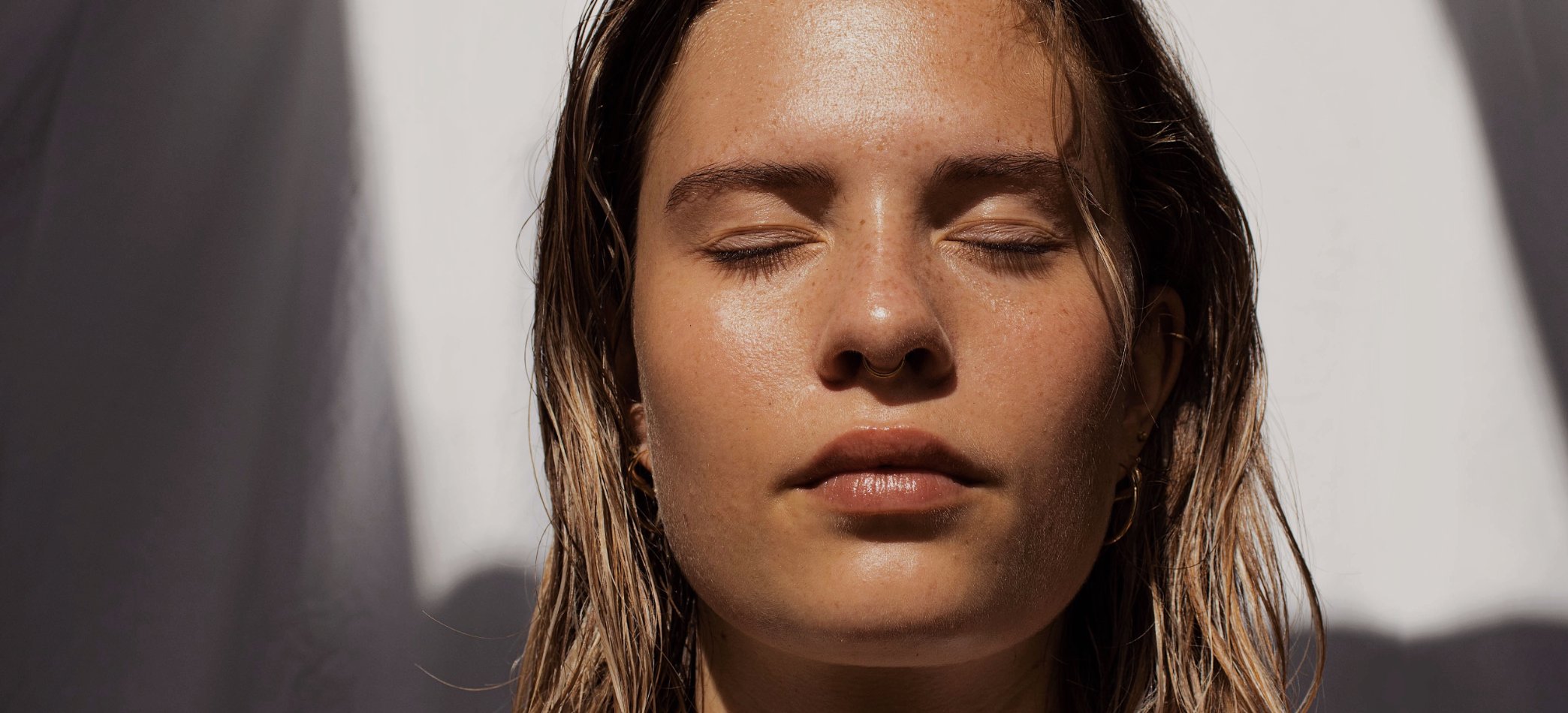
The best facial routine for oily skin
Knowing your skin type is essential to properly care for it.
Oily skin is easy to recognize: its main characteristic is shine. At first glance, it appears sallow, very shiny, dull, with enlarged pores and occasional blemishes.
Oily skin is associated with adolescence, however, it is also very common in adulthood.
This type of skin is more prone to acne, and although various factors (hormones, stress, diet, etc.) influence its appearance, using appropriate skin care products is key.
Plus, your skin changes as you age, so you may have had oily skin before and now have combination skin. That is, you have a T-zone (forehead, nose, and chin) that's oilier than your cheeks.
That's why we want to explain a specific facial routine that focuses primarily on good cleansing and the right active ingredients.
But first, get to know your skin a little better.
Oily skin is usually at its best in the morning, but as the day progresses, it becomes shinier and shinier.
A vicious cycle develops in this skin type. Excess sebum creates a completely unbalanced skin, where bacteria find a perfect place to live. As they arrive, blemishes multiply, whiteheads appear, and the skin becomes irritated. This is why people with oily skin also tend to have spots.
COMMON CAUSES OF OILY SKIN
Hormones
Hormonal changes can stimulate excess sebum production. Hormones fluctuate during puberty, before your period, during pregnancy, and during menopause. Stress or illness can cause hormonal imbalances, resulting in oily skin.
Feeding
Consuming excessive amounts of trans fatty acids, processed carbohydrates, and sugars can cause acne. Following a balanced diet with natural foods is not only beneficial for your skin, but also for your overall health.
Climate
Warm, humid weather can stimulate sebum production, so skin tends to be oilier in the summer months.
Genetics
Many people are simply born with a tendency to produce more sebum. The downside of oily skin. The upside, however, is that your skin is thicker and less prone to wrinkling .
Overcleaning
The more you exfoliate and remove natural sebum from your skin, the more oil is produced to try to restore balance.
Cosmetics
Oily-based makeup clogs pores, creates a shiny appearance, and can cause acne. Harsh products can damage the skin, causing increased sebum production.
Medication
Some prescription medications cause dehydration, so the skin produces more oil to compensate for this deficiency.
HOW TO CARE FOR OILY SKIN
Cleanliness: the cornerstone
Cleansing oily skin is the first step to healthy skin.
In the case of teenagers, we all know they can spend hours in the bathroom… but not necessarily washing their faces!
At these early, complex ages, when hormonal changes are rampant and skin care isn't a priority, it's necessary to educate adolescents about proper hygiene habits to avoid future self-esteem issues stemming from worsening acne.
Why is cleansing so important for oily skin? Because it's the beginning of the whole process.
The sebaceous glands are responsible for producing sebum, and there's no point in trying to achieve blemish-free skin or applying products to treat blackheads if your skin isn't clean. It just won't work!
Oily skin secretes excess sebum, which clogs pores. This can lead to blemishes if bacteria proliferate.
Only with rigorous daily hygiene will the vicious cycle be broken.
In the morning and at night, the skin becomes naturally dirty, with sweat, sebum, dead skin, bacteria, makeup, sunscreen, dust, and pollutant particles adhering to the surface.
Cleansing twice a day is the only way to remove all these accumulated impurities. Otherwise, your skin becomes suffocated, your pores become clogged, and acne appears.
Even in the morning, a simple rinse with water is not enough to remove the impurities that settle on the skin overnight.
The cleansing routine needs to remove all residues without damaging or irritating the skin.
The idea is to maintain the hydrolipidic film that protects the skin and maintain physiological pH levels. A pH that is too basic is the perfect host for bacteria and acne.
Organic powder cleanser is the best option. A cleanser with 99% natural active ingredients selected for its high effectiveness.
Thanks to its added value of postbiotics and prebiotics, it balances the skin's microbiota to control acne-causing bacteria without eliminating the healthy bacteria that contribute to healthy skin. All this without drying or astringent, thus avoiding a rebound effect.
While stimulating the skin's immune system to better respond to changes caused by bacteria, inflammation and redness are reduced.
Also, keep in mind that while exercise is good for your skin, dead skin cells, bacteria, and dirt can build up while you exercise, causing “workout blemishes.”
Remove makeup before exercising, and cleanse your face afterward.
And be gentle with your skin. When we have oily skin, we're tempted to give it a good soapy scrub. But don't!
Hydration: always yes!
One of the biggest mistakes is thinking that because we have oily skin, we don't need to use creams or moisturizers. But there's no bigger mistake!
Hydration is a different aspect than oil. In fact, they are two of the basic pillars of a balanced skin ecosystem, and both must be the correct levels of water and lipids, respectively.
However, the fear of adding excess oil leads many people to avoid using moisturizer.
The secret is to apply the right product.
You should use products that provide the skin with the water it lacks and help prevent the loss of the water it produces itself.
Light creams with creamy-gel or gel textures that are oil/lipid-free, meaning they are not greasy and have fluid textures.
You can even use hyaluronic acid hydrating serums.
Our two recommended products because they meet all the requirements are:
- Hyaluronic acid formulated with three molecular weights to provide maximum hydration both superficially and to naturally stimulate the synthesis of this acid.
- Niacinamide , the personal trainer for oily skin, controls inflammation and redness, and provides sebum regulation. It also prevents hyperpigmentation, which can leave residual marks from blemishes.
- Natural AHA. This cell renewal promotes the removal of dead cells that can clog pores and follicles without the mechanical action that is so harmful to oily skin, as it can spread the infection to healthy skin with the movement of mechanical exfoliants.
- Patch H20 provides exceptional hydration without adding grease and in a long-lasting and sustained manner.
- Niacinamide also gives this type of sallower skin greater luminosity.
Appropriate sunscreen every day
Sun protection is essential for maintaining healthy skin, regardless of your skin type. It helps prevent photoaging, sunburn, and, even more importantly, for oily skin, it helps prevent possible residual marks (spots) caused by the sun's exposure to blemishes.
If the common idea with oily skin is “I don’t use moisturizer because my skin is oily,” another recurring idea is “I don’t apply sunscreen daily because it makes my skin oily.”
Urban legends have done skin care a disservice.
The solution is to find a sunscreen that suits our skin's needs.
Use broad-spectrum sunscreens that are lightweight, fast-absorbing, non-greasy, and specifically designed for the face.
It's vital that your skin is perfectly clean, as a face free of dead cells will be key to oxygenating the tissue, unclogging pores, and ensuring sunscreen penetrates properly without clogging and causing blemishes.
If we use sunscreens with a high content of physical filters, they can clog pores and cause comedones due to obstruction of the pilosebaceous canal.
But today there are sunscreens that are truly marvelous in terms of texture.
Factors with a physical filter combined with other oil-free ones, with a light and non-greasy texture.
There's no excuse not to find your perfect formula.
Is it true that oily skin ages later?
In oily skin, we can say that aging is less noticeable. This doesn't mean that you won't notice the passage of time, but wrinkles become less noticeable, appear later, and appear less pronounced thanks to the lipids/fats that this skin naturally contains, which contribute to its greater elasticity.
But they have a greater tendency to sagging.
It's the most common skin type and sometimes the most difficult to care for. But these recommendations provide the ultimate guide.
Show off healthy and beautiful skin without exceptions.





Leave a comment
This site is protected by hCaptcha and the hCaptcha Privacy Policy and Terms of Service apply.